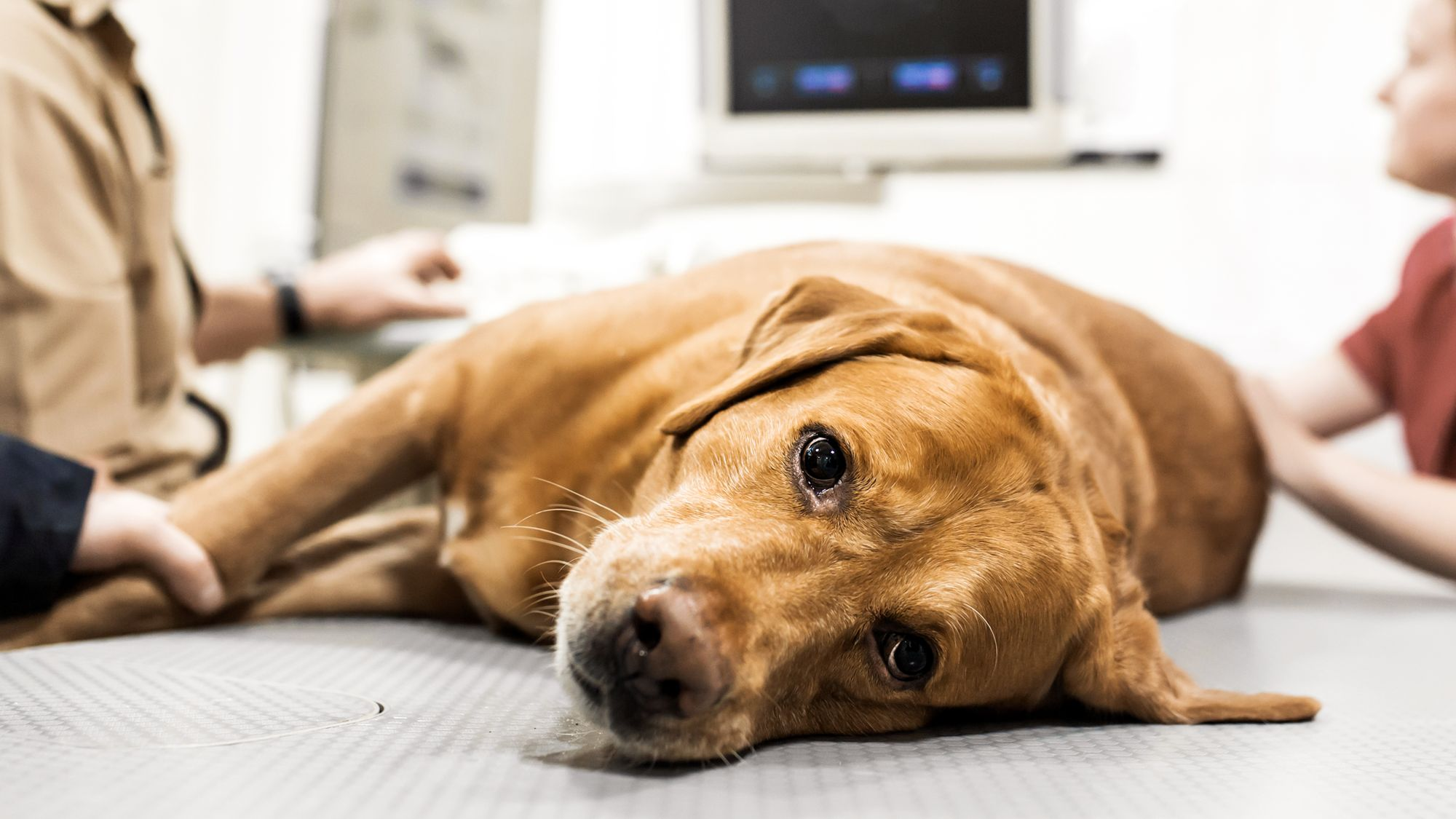Spotting signs of pancreatitis in dogs
Article

The pancreas is a small organ located in the abdomen. It creates hormones that regulate a dog’s blood sugar levels, and it secretes enzymes that help digest fats, proteins, and carbohydrates in the small intestine.
Usually, these enzymes activate once they reach the small intestine. One way pancreatitis can occur is when these enzymes activate prematurely and begin to digest the pancreas itself, which leads to cell destruction and inflammation.
In many cases, the cause of pancreatitis is unknown. It is an extremely painful condition for dogs.
How serious is pancreatitis in dogs?
In the most severe cases, it can cause organ failure and be life-threatening.
Pancreatitis in dogs can either be acute or chronic. An acute attack comes on very suddenly, usually without any previous signs. Chronic pancreatitis may flare up occasionally.
With supportive treatment, many dogs will make a full recovery from acute pancreatitis. However, dogs with chronic pancreatitis may often need ongoing care and can suffer from acute episodes in the future.
Common signs of pancreatitis in dogs
The signs vary depending upon the severity, but the most common signs are:
- Loss of appetite
- Vomiting
- Weakness
- Abdominal pain
- Dehydration
However, it's worth noting some of these signs are also similar to those associated with other gastrointestinal and digestive issues in dogs.

During an acute attack, the dog may adopt the classic “prayer” position, where they place their head to the floor and raise their back end. This is one way that may indicate a dog is experiencing abdominal pain.
In serious cases, the dog may also have trouble breathing and go into shock.
What causes pancreatitis in dogs?
The cause of pancreatitis in dogs is often undetermined, and more research is needed to understand why some dogs are more prone to developing it than others.However, there are some known risk factors and triggers for dogs:
Exposure to high-fat foods
Probably the most well-known trigger of pancreatitis is dietary indiscretion. Even a single serving of a high-fat snack such as bacon or turkey skin can bring on an acute attack, so it’s important to monitor and limit the table scraps your dog is given. Also, make sure they don't have access to other places where scraps may be found, such as the trash.
Obesity
As well as causing alterations to your dog’s bodily functions and potentially reducing life expectancy, obesity is thought to increase the risk of pancreatitis.
Endocrine (hormonal) diseases
If your pet suffers from diabetes, Cushing's disease, hypothyroidism, or hypertriglyceridemia, they may be more likely to get pancreatitis.
Drugs
Certain drugs are thought to be a trigger for pancreatitis.
Trauma to the pancreas
This might be from abdominal surgery or due to an injury.
Pancreatic duct backflow or obstruction
A blockage of the pancreas’ enzyme ducts.
Although it’s not understood if pancreatitis is inheritable in dogs, there does seem to be a genetic link to the condition.
Certain breeds are more susceptible to pancreatitis than others. Miniature Schnauzers and Yorkshire Terriers, for example, are predisposed to acute pancreatitis, while other breeds are more likely to suffer from chronic pancreatitis.
Unfortunately, more research is needed into what causes pancreatitis in dogs. A dog with chronic pancreatitis could go through its entire life with low-grade symptoms and the condition goes undiagnosed. On the other hand, a dog with a genetic predisposition towards acute pancreatitis could have a sudden attack after eating a fatty snack.
The important thing is to make yourself aware of the triggers and signs and to speak to your veterinarian if you ever have concerns.
Diagnosing pancreatitis in dogs
Pancreatitis can be difficult to diagnose as other diseases cause similar signs.A veterinarian will usually do a physical exam and consider the dog’s medical and diet history, before conducting blood and biochemical tests. They often perform an ultrasound too.

How is pancreatitis in dogs treated?
There is no specific cure for pancreatitis, but a veterinarian will use a range of supportive treatments to help manage the dog’s signs and give the pancreas time to recover.This may involve intravenous fluids to rehydrate the body, drugs to prevent vomiting and analgesics to relieve abdominal pain.
A dog with moderate or severe pancreatitis may need to stay in the hospital for at least a few days so their condition can be monitored and managed.
Is there a specific dog pancreatitis diet?
What you feed a dog after they’ve experienced pancreatitis will depend on the initial cause and whether it was acute or chronic.If it was a single bout of acute pancreatitis triggered by a high-fat snack, for example, then the dog may be able to return to their regular diet in time. You’ll just need to monitor their snacks and prevent scavenging in the future to keep them safe.
But if the cause of the pancreatitis is unknown or your dog is suffering from repeated bouts of chronic pancreatitis, then a veterinarian may recommend a low-fat diet for long-term use.
Once your dog has recovered from pancreatitis it's important to keep them on a high-quality diet to support their digestive system, especially if it is sensitive.
Your veterinarian will be able to tell you how best to manage your dog if they have or have had pancreatitis.
This usually involves regular exercise, making sure they don’t eat snacks or scraps with excessive dietary fat, and managing any underlying conditions, if present. They will also be able to offer in-depth guidance on food for dogs suffering from pancreatitis and advise you on the correct energy requirement for your dog.
Related articles
Like & share this page